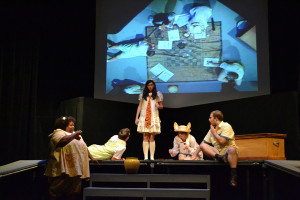
Going into a play with the name Anton Chekhov attached to it, you never really know what to expect. Theater Emory's website describes the Russian master's work as "mesmerizing tales of daily life and the absurd complexities of human impulse." Indeed, Chekhov left a solid – albeit multifaceted – legacy. And that legacy was the double-edged sword of Theater Emory's current production, Watching Chekhov Watching, which runs through Feb. 24 at the Theater Lab in the Donna and Marvin Schwartz Center for Performing Arts.
In that vein, Theater Emory took a slightly different approach to Chekhov. Setting aside Chekhov's plays for the time being, Watching Chekhov Watching instead features three productions, adapted from Chekhov's short stories. Emory faculty members were charged with the delicate task of adapting these works – in two of the three cases, multiple works – into theatrical pieces.
The performances ranged in topic, examining issues such as the poignancy of growing up and the entrapment of everyday life. Still, all three productions maintained an inherently Chekhov tone.
The most archetypally "Chekhov" of the three productions was "The Joke," a short film inspired by the stories "A Joke" and "Boys," adapted by Nicholas Surbey ('10C) and directed by College senior Nikoloz Kevkhishvili. The film was peppered with subtle, quiet moments that seemed to want to signify a grandiose idea. It's just ... no one could quite tell what that idea was. Perhaps because "The Joke" attempted to combine two separate stories, with two separate casts, plots and themes, the overarching theme felt inaccessible.
"The Joke" certainly had a lot going for it: the actors were terrific, the production was exceptional, and the score deserves particular praise. But ultimately, the fusion of these two separate stories felt unnatural, and that jaggedness detracted from the otherwise wonderful qualities of the film.
"In the Ravine" met a similar fate. The production had all the individual elements of great theater: lovely writing, curious staging and remarkable acting. But it was missing that spark that would take it from simply "good" to really first-rate theater. But maybe when you get down to it, some stories are just meant to exist as literature.
"In the Ravine" tried valiantly to maintain the integrity of Chekhov's story, but in doing so, it often relinquished beautiful moments of theatrical tenderness in order to provide literary explanations. Actors often interrupted one another to provide a narration, give a description of the situation, or perform another act clearly meant to enhance the storytelling element of the show. And in the end, this approach just made the production feel inconsistent.
Still, the moments that did leave behind the text to fully invest the audience in the story were truly captivating. Each and every character – notably, the tragic Lipa (College senior Necol Ronda) and the hesitant Anisim (College junior Forrest Manis) – possesses an elaborate backstory, and it takes real talent to effectively convey that history and yet keep the audience devoted to the current action. Yet, the entire cast undeniably succeeded on that count.
But the highlight of the evening clearly lies in "Antosha Chekhonte: A Childhood Suite," an amalgamation of five Chekhov stories centered on youth. What began as a simplistic story of a young boy exploring the "real world" for the first time quickly evolved into an examination of the benefits and drawbacks of growing up.
All six actors of "A Childhood Suite" feature in each of the show's five episodes, but they do not depict specific characters. Rather, they serve as overarching ideas. For that reason, they are bestowed titles such as "The Thinker" and "The Outsider" – labels that are childlike in their categorization. These categories follow the characters as they "grow up" throughout the course of the production, transitioning from carefree, giggly children, to explorative adolescents, and so on.
"A Childhood Suite" undeniably belonged to Mark Cabus, or "The Explorer," who dominated the stage with his impeccable portrayal of a curious child, a jaded old man and everything in between. In the opening chapter, Cabus wanders the stage with the wide-eyed air of an adolescent, fascinated by everything and disappointed only by his inability to discover more. But as the vignettes progress, he grows up to become sensible – even boring.
But the most extraordinary moment of "A Childhood Suite" was the scene in which Cabus, now playing a father, must discipline his son (Andrew Burnette, credited as "The Thinker") for smoking his tobacco. When Burnette's character asks for a bedtime story, Cabus proceeds to tell him an elaborate tale of a powerful emperor and his beloved son, whose demise arises from his habit of smoking.
The two sit on the ground, drawing detailed chalk illustrations of the story. The scene is effective not only for its successful union of youthful wonder with adult sensibilities, but for its expression of how daunting the responsibilities of adulthood can be.
As "The Explorer" asks himself, "Why can't medicine be sweet, and truth beautiful?" Maybe that's the real underlying message of Chekhov's works. They're not always cheery, or manageable, or even accessible. But they're authentic, honest evaluations of life. Perhaps Chekhov himself said it best in "In the Ravine": "Life is long; there will be good and bad to come. There will be everything."
That mindset serves as the mixed blessing that is Chekhov: he can be humorous and dark, lighthearted and tragic, hopeful and morose. In the case of Watching Chekhov Watching, I'm not sure which end of the spectrum got the upper hand – but that conflict is precisely what made it so memorable.
– By Emelia Fredlick
Read More
Trending







